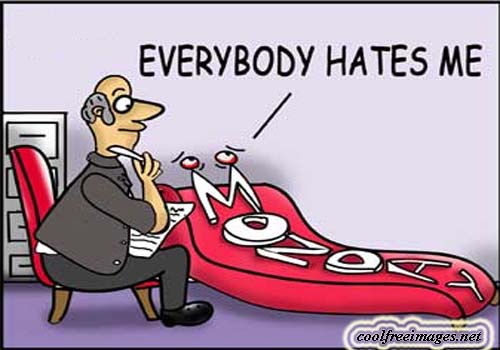| ~ Hall of Heroes ~ SSgt Henry "Red" Erwin Info from this website. |
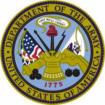 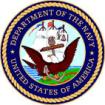 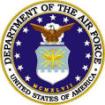 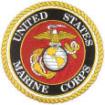 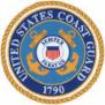 |
By: DaveTroll
Without counting the cost to himself, SSgt. Henry Erwin did what had to be done to save the B-29 crew.
We may marvel at the heroism and tenacity of the men whose stories have been told in this column, but few readers can truly comprehend the suffering of many Vietnam POWs, the epic struggle of Lance Sijan, or the gallantry of Jack Mathis. What they did lies beyond the realm of our experience. But most of us have borne in some small degree the kind of anguish SSgt. Henry E. Erwin endured to save the lives of his fellow crewmen. We can empathize with his suffering and perhaps more fully appreciate the depth of his heroism.
On April 12, 1945, the City of Los Angeles, a 29th Bombardment Group aircraft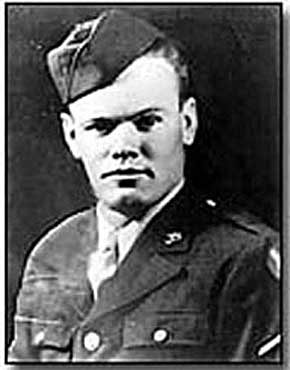 commanded by Capt. George Simeral, led a formation of Guam-based B-29s in a low-level attack on a chemical plant at Koriyama, some 120 miles north of Tokyo. It was the 11th combat mission for Simeral's lead crew. Alabama-born Henry Erwin, known to his family as "Gene" and to his squadron mates as "Red," was the B-29's radio operator. According to retired Colonel Simeral, a holder of the Distinguished Service Cross, Erwin was "a country boy, quiet, unassuming, religiously devout," and the best radioman of the 52d Bomb Squadron. commanded by Capt. George Simeral, led a formation of Guam-based B-29s in a low-level attack on a chemical plant at Koriyama, some 120 miles north of Tokyo. It was the 11th combat mission for Simeral's lead crew. Alabama-born Henry Erwin, known to his family as "Gene" and to his squadron mates as "Red," was the B-29's radio operator. According to retired Colonel Simeral, a holder of the Distinguished Service Cross, Erwin was "a country boy, quiet, unassuming, religiously devout," and the best radioman of the 52d Bomb Squadron.
One of Erwin's additional duties was to drop a phosphorus smoke bomb through a chute in the B-29's floor when the lead plane reached an assembly area over enemy territory. He was given the signal to drop the bomb when the City of Los Angeles was off the south coast of Japan and under attack by flak ships. Erwin, bare-headed and with shirtsleeves rolled up, pulled the pin and released his bomb into the chute. The fuse malfunctioned, igniting the phosphorus, which burned at a temperature of 1,300 degrees. (The heating element of an electric range glows red at 1,100 degrees.) The canister blew back up the chute into Erwin's face, blinding him, searing off one ear, and filling the B-29 with heavy smoke that obscured the pilots' instrument panel.
Erwin knew that the bomb would burn through the metal floor into the bomb bay. It had to be jettisoned or the aircraft and crew were lost. Totally blind, he located the burning bomb on the floor, picked it up in his bare hands, and stumbled forward toward the flight deck, aiming to throw it out the copilot's window. As he groped his way around the gun turret, his face and arms covered with ignited phosphorus, his path was blocked by the navigator's folding table, hinged to the wall but now down and locked. The navigator had left his table to make a sighting.
Erwin needed both hands to release the table's latches. While he felt for them, he held the white-hot bomb under his bare right arm. In those seconds, the phosphorus burned through his flesh to the bone. Now a walking torch, Erwin staggered on into the pit, threw the bomb out the window, and collapsed between the pilots' seats.
Simeral, no longer blinded by smoke, pulled the B-29 out of a dive at 300 feet above the water and turned toward Iwo Jima where Erwin could be given emergency treatment. Horrified crew members extinguished the flames consuming Erwin's clothing and administered first aid. Whenever the sergeant's burns were uncovered, phosphorus embedded in his flesh began to smoulder. In terrible pain, Erwin remained conscious throughout the flight to Iwo. He spoke only to inquire about the safety of the crew.
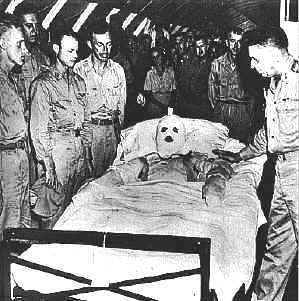 The medics at Iwo did not believe Erwin could survive. Cutting through red tape, Army Air Force officials, spurred by Maj. Gen. Curtis LeMay and Brig. Gen. Lauris Norstad, approved award of the Medal of Honor in a matter of hours, so a presentation could be made while Erwin lived. A Medal was flown to Guam and presented in the hospital there. The medics at Iwo did not believe Erwin could survive. Cutting through red tape, Army Air Force officials, spurred by Maj. Gen. Curtis LeMay and Brig. Gen. Lauris Norstad, approved award of the Medal of Honor in a matter of hours, so a presentation could be made while Erwin lived. A Medal was flown to Guam and presented in the hospital there.
Contrary to the flight surgeons' opinion, Erwin did survive. He was evacuated to the States, and after 30 months and reconstructive surgery that restored his eyesight and the use of one arm, Erwin was given a disability discharge from the AAF as a master sergeant in October 1947. For 37 years he served as a Veterans' Benefit Counselor at the VA Hospital in Birmingham.
While Erwin lay swathed in bandages in the hospital at Guam, Gen. Hap Arnold wrote: "I regard your act as one of the bravest in the records of this war." No one could argue with that judgment. Erwin was, and always will remain, a hero among heroes.
Related Links:
http://www.homeofheroes.com/wings/erwin.html
http://www.homeofheroes.com/wings/erwin_tribute.html |
Citation
Rank and organization: Staff Sergeant, U.S. Army Air Corps, 52d Bombardment Squadron, 29th Bombardment Group, 20th Air Force.
Place and date: Koriyama, Japan, 12 April 1945.
Entered service at: Bessemer, Ala.
Born: 8 May 1921, Adamsville, Ala. G.O. No.: 44, 6 June 1945.
Citation: He was the radio operator of a B-29 airplane leading a group formation to attack Koriyama, Japan. He was charged with the additional duty of dropping phosphoresce smoke bombs to aid in assembling the group when the launching point was reached. Upon entering the assembly area, aircraft fire and enemy fighter opposition was encountered. Among the phosphoresce bombs launched by S/Sgt. Erwin, 1 proved faulty, exploding in the launching chute, and shot back into the interior of the aircraft, striking him in the face. The burning phosphoresce obliterated his nose and completely blinded him. Smoke filled the plane, obscuring the vision of the pilot. S/Sgt. Erwin realized that the aircraft and crew would be lost if the burning bomb remained in the plane. Without regard for his own safety, he picked it up and feeling his way, instinctively, crawled around the gun turret and headed for the copilot's window. He found the navigator's table obstructing his passage. Grasping the burning bomb between his forearm and body, he unleashed the spring lock and raised the table. Struggling through the narrow passage he stumbled forward into the smoke-filled pilot's compartment. Groping with his burning hands, he located the window and threw the bomb out. Completely aflame, he fell back upon the floor. The smoke cleared, the pilot, at 300 feet, pulled the plane out of its dive. S/Sgt. Erwin's gallantry and heroism above and beyond the call of duty saved the lives of his comrades. |
| Please remember the Canteen is here to honor, support and entertain our troops and their families. This is a politics-free zone! Thanks for helping us in our mission! |
|
